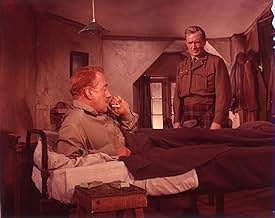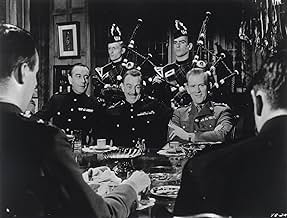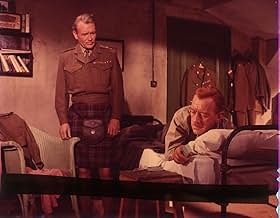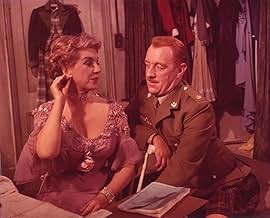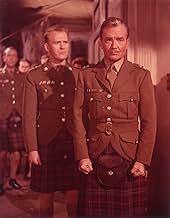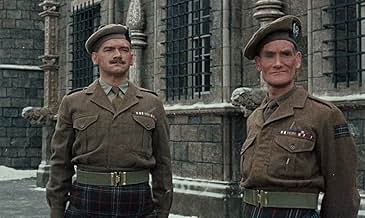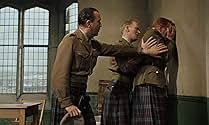Agrega una trama en tu idiomaAfter World War II, a Highland Regiment's acting Commanding Officer, who rose from the ranks, is replaced by a peace-time Oxford-educated Commanding Officer, leading to a dramatic conflict b... Leer todoAfter World War II, a Highland Regiment's acting Commanding Officer, who rose from the ranks, is replaced by a peace-time Oxford-educated Commanding Officer, leading to a dramatic conflict between the two.After World War II, a Highland Regiment's acting Commanding Officer, who rose from the ranks, is replaced by a peace-time Oxford-educated Commanding Officer, leading to a dramatic conflict between the two.
- Nominado a 1 premio Óscar
- 2 premios ganados y 7 nominaciones en total
Opiniones destacadas
I've heard of this movie for a long time, and knew that it was well-liked (Guinness considered it one of his best performances), but it wasn't what I was expecting. It's a psychological study of these two men, and, with the Barrow character, an early examination of PTSD before it was called that (he was a P. O. W. In a Japanese camp, and was tortured). The accents can be a bit much, and if you don't like bagpipes, this is definitely not the movie for you, but I thought the acting was terrific, and the slow-burn drama builds to a shattering conclusion.
I would take issue with the reviewer who said that the Mills character would never have been given command. Clearly he had been highly educated, had a long and distinguished career in a headquarters job following a traumatic time as a POW of the Japanese. He would have at least earned some kind of moral right at the end of his career and in peacetime to be given the job that he believed he really wanted and might have thought to have been among friends. He would most likely have been highly respected owed favours and been able to pull strings. Had Jock Sinclair (Guinness) - unashamedly uneducated, rough and proud to have been educated in Barlinnie jail, Glasgow and deeply popular with his men not been the officer he replaced, most likely Colonel Barrow would have made a success of it. The whole entirely believable tragedy came about through the grotesque mischance that with these so different characters, one had to wrest command - and respect of the men - from the other. Colonel Barrow's fragility was only exposed when he tried to impose his English "civilising" ways on the one person whose whole being rejected them. Bad enough if it had been simply about class, here it was a battle for the Scottish soul. These deeper levels of conflict deriving from earlier historical intra-Scottish battles was suggested by one reviewer. The film tells a story which perhaps could have been set in almost any country with a strong military tradition - France. Germany, Japan etc rather like its near name-sake "Paths of Glory" by Stanley Kubrick set in WW1 France. Here though the central conflict presumably had very deep roots in Scottish ethnic and tribal history of clan wars, of Highlanders vs Lowlanders even of those supposed English-loving "traitors" who "sold" Scotland to "a parcel of rogues" (The English) in 1707. It may well be that for Sinclair, the entirely Anglicised Colonel Barrow (gin-drinking, aloof, distant and without a hint of a Scottish accent) represented exactly that kind of treacherous pseudo-Scot.
One reviewer describes it as "pure John Ford" leaving it unclear if he is suggesting that it was similar or derivative. With art in general, its lower and by definition least original forms ape others. This film does not ape any other - as already said the intensity of the conflict derives not just from class but from old old historical grievances between two intimately close nations. In "Old" Europe grievances and rivalries ran long and deep.
Just a rather sad footnote. One reviewer mentioned similarities to earlier John Ford/John Wayne movies. The entire John Wayne archive is to be seen on a continuously circulating basis on two of Britain's five national television channels State broadcaster the BBC and so-called public service broadcaster Channel 4. Yet in contrast Tunes of Glory has rarely been shown. It reappeared 2 years ago but in a poor quality print on a remote satellite channel which plays mainly public domain material. Many of Britain's fine vigorous quality films of the 1960s have never been shown at all on British television until a few months ago when again a very minor satellite channel started showing them: Otley, The Hireling, The Reckoning and others. I did not see them originally and it was revelation seeing the bold acting and directing talent which existed then and how sad is the current decline into the Lock Stock etc formulaic gangster stuff. Very curious indeed that great British films are not shown on the supposed British public service channels and it is left to small satellite channels Movies4Men and Simply Movies to show them. Very curious indeed. Public service broadcasting not in the service of the public.
I am not as enamored of "Tunes of Glory" as I am of, say, "Bridge on the River Kwai," but it is without question a powerful movie. The conflict between Sinclair and Barrow is palpable; I think, in particular, of Mill's violently trembling rage during the dancing scene, and Guinness's dismissive ridicule of Barrow's deepest confidences ("toy soldiers!") during his attempt to con him into clemency. Sinclair's grief-stricken collapse at the end is truly an unforgettable scene and a tribute to Guinness's power.
Guinness plays an angry and blustering Scottish officer who may also be an alcoholic (he at least is a problem drinker and shows many signs of alcoholism). The film begins with this popular officer throwing a farewell party, of sorts, with the men in his command. It seems that Guinness was given temporary command but a replacement (John Mills) is due to arrive shortly--dashing Guinness' hopes for this position becoming permanent.
Because Guinness' character is so very flawed and petty, he does much to try to undermine the new C.O.. In particular, Mills is a "by the book" sort of officer and Guinness ignores changes Mills orders--and by example, derision and a lack of respect for Mills spreads through the ranks. Instead of behaving like officers and gentlemen, the men behave like this is some sort of popularity contest and they show contempt for their new leader. None of this is helped by Guinness' drinking, as it gets him in trouble and creates serious problems for the regiment.
While Mills, as usual, does a great job in the film playing a man who is suffering from Post-traumatic Stress Disorder, the film is definitely Guinness'. His boorish character is a great example of him once again immersing himself into a character and the way he responds to the tragedy near the end of the film gives the character great depth and a bit of sympathy--something you needed to make this a stand-out film.
The bottom line is that this film is extremely well-crafted. The acting is universally excellent, the script tense and well-written and the film is great unless you are the type of person who demands lots of action. While a film about the military, this is no action film. Wonderful.
¿Sabías que…?
- TriviaSir Alec Guinness was offered the role of Lieutenant Colonel Barrow, but asked for the role of Major Sinclair instead. He then suggested Sir John Mills for the other role.
- ErroresPipe Major MacLean is never shown with a set of bagpipes. In particular, he is a mere observer at band practice. A pipe major is not only the leader of the band but also its chief instructor, and it is unthinkable that he would not play an active role in all practices.
- Citas
Major Jock Sinclair, D.S.O., M.M.: We're on a first name basis in this regiment. Your first name is Derek. My first name is Major.
- ConexionesFeatured in Film Extra: Alec Guiness (1973)
Selecciones populares
- How long is Tunes of Glory?Con tecnología de Alexa
Detalles
- Fecha de lanzamiento
- País de origen
- Idioma
- También se conoce como
- Tunes of Glory
- Locaciones de filmación
- Stirling Castle, Stirling, Escocia, Reino Unido(establishing shots)
- Productoras
- Ver más créditos de la compañía en IMDbPro
- Tiempo de ejecución
- 1h 47min(107 min)
- Color
- Relación de aspecto
- 1.66 : 1


